Dalit Community in Bangladesh : FAIR as a Catalyst for Socio-Economic Change
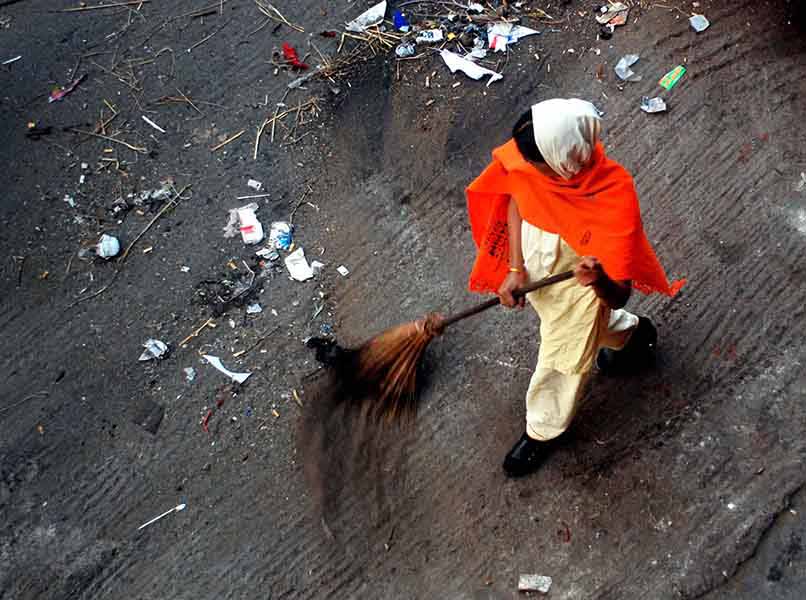
1. Introduction:
The Dalit community in Bangladesh has historically endured systemic discrimination, social exclusion, and severe economic hardships stemming from deeply rooted caste-based oppression.
With approximately 5.5 million Dalits living in Bangladesh, this marginalized population continues to face numerous obstacles, including poverty, limited access to education, job exclusion, and widespread social stigma. Often labeled as “untouchable,” members of the Dalit community are confined to low-paying, traditionally stigmatized occupations such as cleaning, leatherwork, waste management, and manual labor, severely restricting their social mobility.
Despite constitutional commitments and affirmative action policies, the Dalit community in Bangladesh remains trapped in cycles of deprivation, struggling daily for fundamental rights such as housing, healthcare, and legal protection from caste-based discrimination. Dalit women and children face compounded vulnerabilities, experiencing gender-based violence, wage disparities, and barriers to educational attainment.
Addressing these persistent challenges requires collective effort and strong advocacy. Community-based Organizations dedicated to the Dalit rights movement, such as Bangladesh Harijon Oikya Parishad and other community-led initiatives, play crucial roles in empowering Dalit communities, advocating for policy reforms, and promoting social inclusion.
In addition, donor agencies such as Manusher Jonno Foundation (MJF) and Research Initiatives, Bangladesh (RIB) have increased financial and strategic support to strengthen research, advocacy, and community mobilization initiatives for Dalit empowerment.
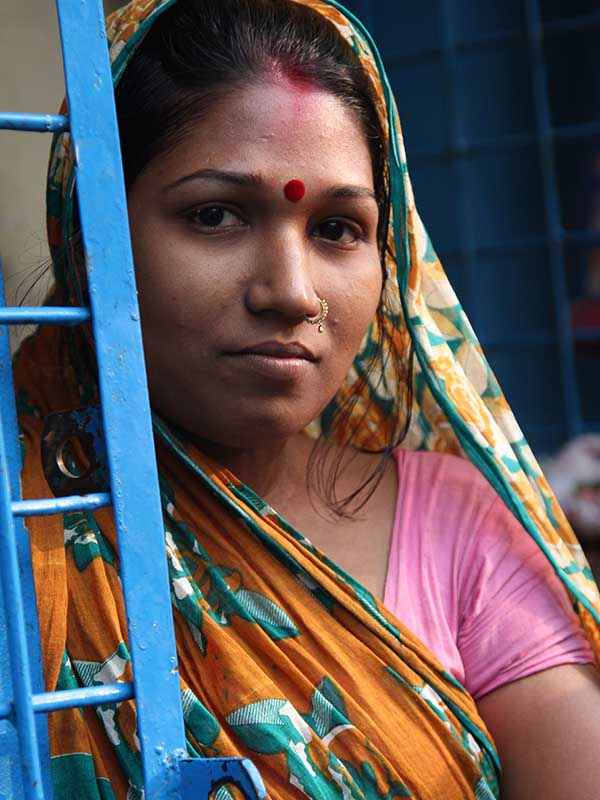
Friends Association for Integrated Revolution (FAIR) has been a prominent catalyst for socio-economic transformation among these advocacy groups. Since its inception in 2001, FAIR has focused on empowering underprivileged communities, particularly Dalits, through research-based interventions, capacity building, awareness campaigns , and advocacy initiatives.
FAIR’s mission revolves around eliminating caste-based discrimination, uplifting socio-economic conditions, and fostering inclusive development. Through collaboration with community-based organizations and advocacy networks, FAIR continues to champion the rights and dignity of the Dalit community, aiming to create sustainable change and equality in Bangladesh.
2. Understanding the Dalit Community in Bangladesh
The term Dalit means “oppressed” or “deprived.” Historically derived from the caste-based social hierarchy of the Indian subcontinent, the Dalit community in Bangladesh represents one of the most socially marginalized and economically disadvantaged populations. Although Bangladesh’s constitution ensures equality, Dalits continue to face systemic caste-based oppression, widespread discrimination, and profound social exclusion.
The Dalit community in Bangladesh comprises various sub-groups. The two main categories are:
- Bengali Dalits: Including groups such as Charmokar (Cobblers), Malakar (Garland Makers), Kumar (Potters), Malo (Fishermen), and Rana Karmokar (Blacksmiths). These communities face severe discrimination, poverty, and limited access to social services.
- Non-Bengali Dalits: These are communities who migrated to Bangladesh before 1947, primarily from Uttar Pradesh, Bihar, Andhra Pradesh, and Odisha. They include groups like Kanpuri, Telegu, Rishis, and Balmikis, predominantly involved in occupations such as cleaning, sanitation, and tea-garden labor.
Historically considered “untouchable,” the Dalit community in Bangladesh continues to experience segregation and stigmatization, with families often confined to overcrowded settlements lacking basic sanitation and infrastructure. Dalit children frequently encounter bullying and discrimination in schools, leading to high dropout rates, while Dalit women face compounded vulnerabilities, including gender-based violence and economic disparities.
Addressing the plight of Dalits in Bangladesh requires sustained advocacy, social awareness, and effective policy interventions, including legal reforms and economic empowerment programs. Organizations like FAIR (Friends Association for Integrated Revolution) play a crucial role in mobilizing and empowering Dalits towards achieving social justice and equality.
3. Key Causes of Dalit Deprivation in Bangladesh
The deprivation experienced by the Dalit Community in Bangladesh stems from deeply embedded caste-based discrimination and systematic marginalization. Historically regarded as “untouchables,” Dalits face ongoing exclusion, resulting in limited access to essential services such as education, healthcare, and employment. Below are key causes fueling this deprivation:
- Caste-Based Discrimination: Dalits face severe social stigma due to traditional caste hierarchies, perpetuated by cultural and religious beliefs. This systemic prejudice confines them to low-paying, stigmatized occupations, restricting their social mobility and economic progress.
- Historical Oppression: For centuries, the Dalit population in Bangladesh has endured social exclusion, forced labor, and subjugation by dominant groups. This historical marginalization has kept them trapped in generational poverty, limiting their access to education and fair employment opportunities.
- Landlessness and Eviction: Most Dalits, particularly those from Harijan communities, do not own land or productive assets. This landlessness leads to instability, insecurity, and continuous vulnerability to eviction from temporary settlements.
- Lack of Education and Skill Development: Due to social stigma and poverty, Dalit children frequently drop out of school, limiting their educational attainment. This lack of education restricts employment opportunities and keeps them confined to traditional, low-paid jobs.
- Political Marginalization and Limited Representation: Dalits have minimal political influence and representation, hindering their ability to advocate for policy changes and equal rights. Their absence from decision-making processes perpetuates their socio-economic deprivation and limits access to public resources.
- Gender and Caste-Based Violence – Dalit women face double discrimination, including gender-based violence and wage inequality.
- Limited Access to Healthcare – Many Dalits are deprived of essential health services and sanitation facilities.
- Judicial Bias – The justice system often fails to protect Dalits from violence and discrimination.
- Lack of Awareness and Leadership – Many Dalits lack leadership training and awareness about their rights.
Addressing these interconnected causes requires comprehensive policies, active advocacy, and focused empowerment programs aimed at promoting inclusion, dignity, and social justice for the Dalit Community in Bangladesh.
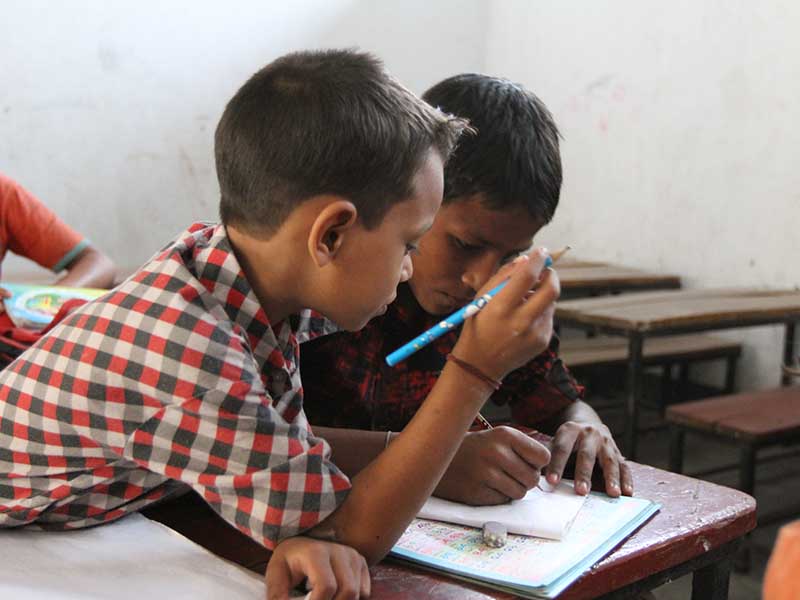
4. The Role of FAIR in Empowering Dalits
Since its inception in 2001, FAIR (Friends Association for Integrated Revolution) has played a significant role in empowering the Dalit community in Bangladesh. Recognizing the systemic caste-based discrimination and extreme marginalization faced by Dalits, FAIR’s core vision revolves around achieving equality, dignity, and socio-economic justice for this historically oppressed community.
FAIR began its journey with a clear vision: to bring marginalized communities into the mainstream of development through strategic advocacy, community mobilization, and empowerment initiatives. From the outset, the organization has focused intensively on identifying and addressing key challenges like social exclusion, lack of education, and job discrimination prevalent among the Dalit people in Bangladesh. FAIR conducted critical research and surveys in various Dalit settlements, including Kushtia, to identify the underlying causes of poverty and social exclusion.
The organization’s advocacy and policy engagement efforts have substantially influenced government policies aimed at Dalit welfare. FAIR has partnered with community-based groups like the Bangladesh Harijon Oikya Parishad, providing technical assistance and capacity-building support to amplify Dalit voices nationally. By strengthening Dalit-led organizations, FAIR has enabled Dalits to advocate effectively for their rights, contributing to notable policy changes, including job quotas for Dalits in municipalities and scholarships for Dalit students.
FAIR continues to focus on education, vocational training, economic empowerment, and social awareness campaigns, ensuring the Dalit community in Bangladesh is equipped to challenge systemic discrimination and achieve greater social inclusion and dignity.

5. How FAIR’s Efforts Have Influenced Government Actions
FAIR’s sustained advocacy has significantly influenced the Government of Bangladesh to implement tangible measures for the empowerment and inclusion of the Dalit community in Bangladesh. Recognizing the persistent advocacy efforts and comprehensive research conducted by FAIR, the government has taken concrete steps to address caste-based discrimination and uplift Dalits socially, economically, and politically.
Key government initiatives influenced by FAIR’s advocacy include:
- Government Quotas & Affirmative Action:
- Reserved quotas for Dalit students in major universities, including Dhaka University, Jahangirnagar University, and Islamic University Kushtia, ensuring equitable access to higher education.
- Implementation of an employment quota allocating 80% of municipal cleaner and sanitation roles specifically for Dalit individuals, enhancing economic stability and social dignity.
- Recognition in National Policy and Development Strategies:
- Dalit community representation in national policy formulation processes, including integration into social protection and national development strategies, reflecting greater awareness and governmental acknowledgment of Dalit rights and needs.
- Economic and Social Empowerment Initiatives:
- Special projects by the Ministry of Social Services to economically uplift the Dalit community through targeted vocational training, skill development, and scholarship programs aimed at youth empowerment.
- Inclusion of Dalit communities in various government-led social safety-net programs, which provide critical financial aid and resources to marginalized families.
- Targeted Housing and Infrastructure Development:
- Initiatives by City Corporations and municipalities to construct and improve housing facilities for Harijan communities, addressing the longstanding issue of landlessness and providing improved living conditions for Dalits.
These proactive government measures, driven by FAIR’s comprehensive research, persistent awareness campaigns, and effective lobbying efforts, have significantly enhanced the socio-economic status and social dignity of the Dalit community in Bangladesh. FAIR’s continued advocacy is vital in sustaining this momentum and achieving further systemic changes.
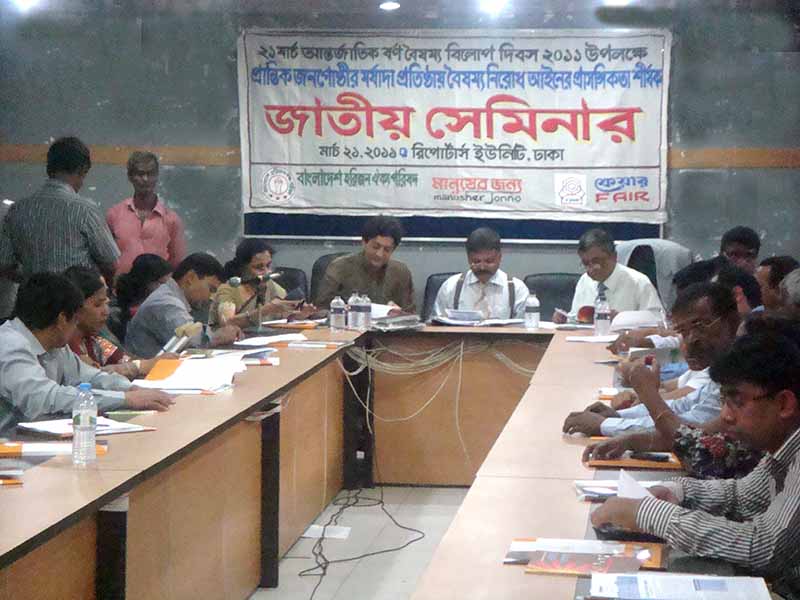
6. Socio-Economic Impact of FAIR’s Initiatives
The sustained advocacy efforts by FAIR (Friends Association for Integrated Revolution) have significantly influenced government policies and initiatives for empowering the Dalit community in Bangladesh. By consistently highlighting Dalit rights, social exclusion, and systemic discrimination, FAIR successfully placed these critical issues onto the national policy agenda. This collaborative advocacy has led to concrete governmental measures in education, employment, community development, and legal protections. As a result, notable social, economic, and political transformations have taken place within the Dalit community, reflecting increased opportunities, reduced social stigma, and strengthened organizational capacity. Below is a detailed exploration of how these governmental actions—triggered and supported by FAIR’s advocacy—have positively impacted the Dalit community across Bangladesh.
Here’s the detailed impact of FAIR’s advocacy and the resulting government initiatives on the Harijan community in Bangladesh, clearly presented under social, economic, and political categories:
Social Impacts:
- Improved Access to Education: Due to the government’s introduction of specific university quotas, Dalit students in Bangladesh have increased opportunities for higher education, contributing significantly to reducing social inequalities. Educational scholarships provided by the Department of Social Services have reduced dropout rates, creating pathways for sustainable social mobility.
- Increased Social Inclusion: Awareness campaigns and community programs initiated by FAIR have helped reduce social stigma and prejudice against the Dalit community in Bangladesh. Increased interaction with mainstream society has reduced caste-based discrimination and has fostered greater acceptance of Dalits as equal citizens.
- Enhanced Community Confidence: The empowerment programs and continuous advocacy by FAIR have significantly enhanced self-esteem, confidence, and assertiveness within the Dalit community, reducing their historical “moral shyness” or inhibition in voicing demands for rights and justice.
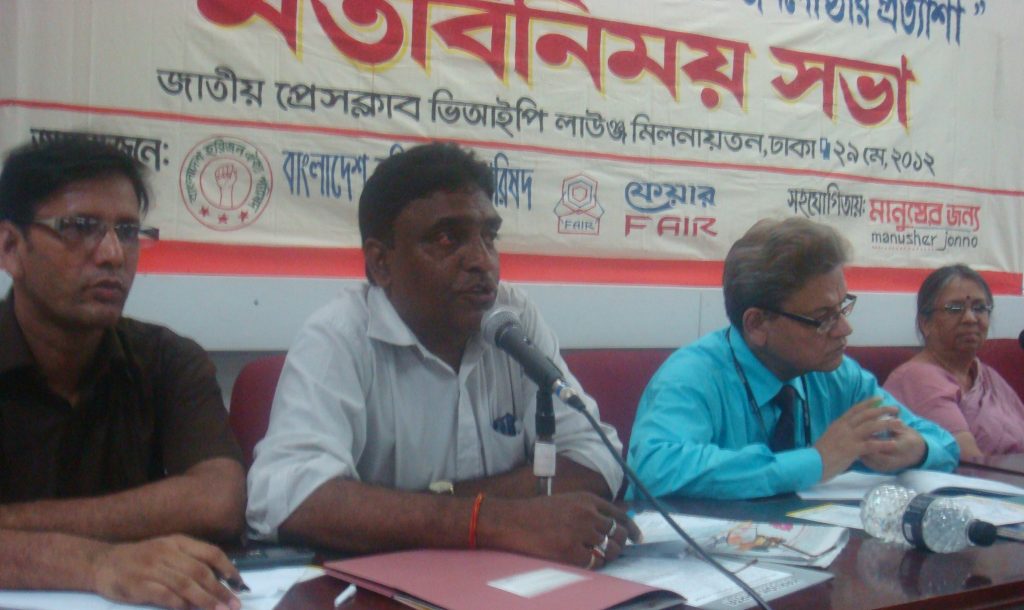
Economic Impacts:
- Job Security and Economic Stability: The implementation of an 80% job quota for Dalits in sanitation and cleaning roles by the government has significantly improved employment security and economic stability within the Dalit community. This has ensured a steady income, reducing economic vulnerability.
- Vocational Skills and Employment Opportunities: Training programs and vocational education initiatives supported by FAIR and the government have enabled many Dalit youth to acquire marketable skills, expanding their employment opportunities beyond traditional low-paying occupations.
- Improved Living Standards: Government-driven housing initiatives for Harijan communities have positively impacted living standards by providing improved housing and sanitation facilities. Enhanced access to social safety-net programs has further supported Dalits’ economic resilience, contributing to overall community well-being.
Political Impacts:
- Strengthened Organizational Capacity: With FAIR’s support, organizations like the Bangladesh Harijan Oikya Parishad have significantly improved their organizational effectiveness and leadership capabilities. This has empowered Dalit leaders and enabled them to engage more effectively in advocacy and political dialogues at both local and national levels.
- Increased Political Representation: Sustained advocacy has ensured that the voices of the Dalit community are increasingly considered in national policymaking. Government recognition of Dalit rights has resulted in Dalit representatives participating more actively in various policy discussions, contributing to more inclusive decision-making processes.
- Youth Leadership and Advocacy: FAIR’s initiatives have mobilized and empowered Dalit youth to actively participate in advocating for their rights. These emerging leaders are significantly influencing local governance and political processes, advocating effectively for community interests and ensuring better political accountability towards the Dalit population.
In summary, FAIR’s sustained efforts, coupled with supportive government actions, have created transformative social, economic, and political impacts on the Dalit People in Bangladesh, driving them towards greater empowerment, equality, and inclusion.
7. Challenges and Barriers to Dalit Empowerment
Despite the progress achieved through FAIR’s advocacy and government initiatives, the Dalit community in Bangladesh still faces several significant challenges and barriers to empowerment and inclusion:
- Systemic Discrimination: Persistent discrimination in education, employment, and access to public services continues to limit opportunities for Dalits.
- Political Marginalization: Lack of adequate political representation restricts Dalit voices and influence in policy-making processes.
- Social Stigma: Deep-rooted caste-based attitudes in society perpetuate exclusion, limiting social integration and acceptance of Dalits.
- Resource Constraints: Limited funding and resources for advocacy and community development programs slow the pace of sustained empowerment initiatives.
- Limited Awareness: Insufficient public understanding and awareness regarding Dalit rights and issues hinder broader societal support and solidarity.
- Weak Legal Enforcement: Delays in formalizing and enforcing anti-discrimination laws prevent effective legal protection for Dalits from caste-based discrimination and violence.
Addressing these barriers requires continued collaborative efforts among government agencies, civil society, and the broader community to create lasting and meaningful change for the Dalits in Bangladesh.
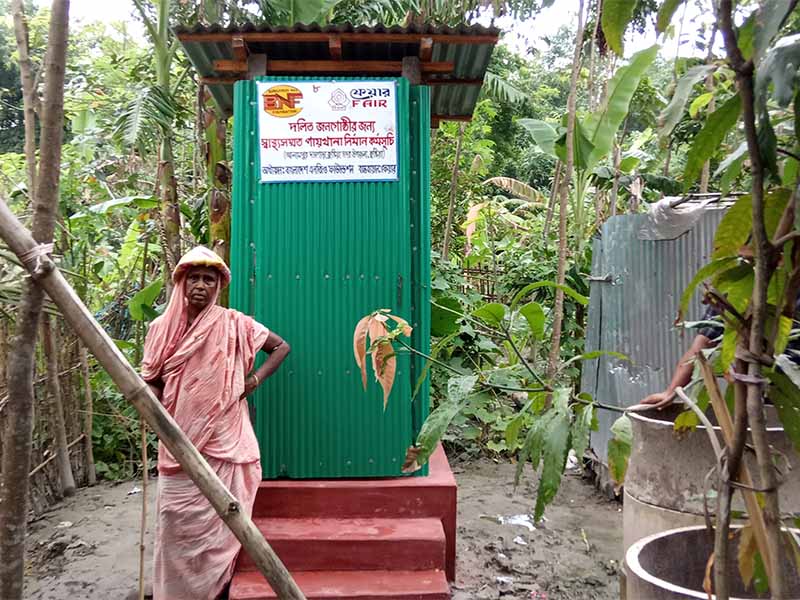
8. Future Roadmap: How FAIR is Driving Sustainable Change
FAIR remains dedicated to the continued empowerment and sustainable transformation of the Dalits in Bangladesh through long-term, strategic initiatives. To achieve lasting impact, FAIR has outlined a future roadmap that includes:
- Upcoming Initiatives for Dalit Empowerment: FAIR plans to launch more focused interventions, emphasizing education, vocational training, land & housing facilities, and leadership development, aiming to build stronger community leaders from within the Dalit community in Bangladesh.
- Expansion of FAIR’s Community-driven Projects: Building on past successes, FAIR intends to expand its successful community-driven programs across additional districts, targeting remote and underserved Dalit populations to amplify socio-economic empowerment and awareness.
- Role of Technology & Digital Literacy in Economic Inclusion: Recognizing the importance of digital skills, FAIR is preparing to introduce technology-based training programs to enhance digital literacy among Dalit youth. These initiatives will improve job readiness, entrepreneurial opportunities, and overall economic inclusion in the rapidly evolving job market.
- Call for Support: FAIR emphasizes collaboration and invites individuals, organizations, and policymakers to actively participate in the movement for Dalit rights. Contributions can include volunteering, financial support, partnership in skill-development initiatives, advocacy, or technical assistance to uplift Dalits and ensure sustainable progress.
Through these well-planned initiatives, FAIR continues its journey to break the cycle of discrimination and poverty, fostering a future of dignity, equality, and inclusive growth for the Dalits.
9. Conclusion
FAIR’s ongoing commitment has played a vital role in promoting social justice and Dalit empowerment in Bangladesh. Through targeted advocacy, educational initiatives, vocational training, and capacity-building programs, FAIR has significantly improved the socio-economic conditions of the Dalit in Bangladesh, enabling them to challenge systemic discrimination and exclusion effectively.
However, achieving true equality and dignity for Dalits requires persistent efforts, including continued advocacy and policy reforms. Addressing deeply rooted caste-based discrimination, economic marginalization, and limited access to public services remains critical. Government bodies, civil society organizations, and community stakeholders must collaborate to ensure sustainable, long-lasting progress.
As FAIR continues its mission to empower Dalits, collective support is crucial. We invite individuals, organizations, and policymakers to join hands with FAIR in creating a just and equitable society. Your support through active engagement, advocacy, donations, or strategic partnerships can amplify the positive changes and uplift the Dalit community in Bangladesh.
Together, let us continue striving for a society where every Dalit enjoys equal rights, dignity, and opportunities.
Take action today—partner with FAIR to support Dalit rights and empowerment in Bangladesh!
